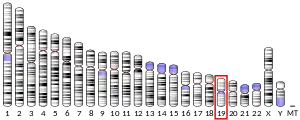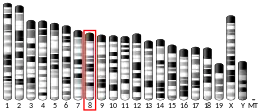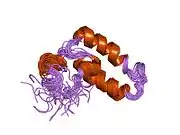DnaJ homolog subfamily B member 1 is a protein that in humans is encoded by the DNAJB1 gene.[5][6][7]
A fusion protein of DNAJB1 and PRKACA drives fibrolemallar hepatocellular carcinoma, a type of rare liver cancer.[8]
Interactions
DNAJB1 has been shown to interact with:
References
- 1 2 3 GRCh38: Ensembl release 89: ENSG00000132002 - Ensembl, May 2017
- 1 2 3 GRCm38: Ensembl release 89: ENSMUSG00000005483 - Ensembl, May 2017
- ↑ "Human PubMed Reference:". National Center for Biotechnology Information, U.S. National Library of Medicine.
- ↑ "Mouse PubMed Reference:". National Center for Biotechnology Information, U.S. National Library of Medicine.
- ↑ Hata M, Okumura K, Seto M, Ohtsuka K (December 1996). "Genomic cloning of a human heat shock protein 40 (Hsp40) gene (HSPF1) and its chromosomal localization to 19p13.2". Genomics. 38 (3): 446–449. doi:10.1006/geno.1996.0653. PMID 8975727.
- ↑ Ohtsuka K (November 1993). "Cloning of a cDNA for heat-shock protein hsp40, a human homologue of bacterial DnaJ". Biochemical and Biophysical Research Communications. 197 (1): 235–240. doi:10.1006/bbrc.1993.2466. PMID 8250930.
- ↑ "Entrez Gene: DNAJB1 DnaJ (Hsp40) homolog, subfamily B, member 1".
- ↑ Neumayer C, Ng D, Jiang CS, Qureshi A, Lalazar G, Vaughan R, Simon SM (January 2023). "Oncogenic Addiction of Fibrolamellar Hepatocellular Carcinoma to the Fusion Kinase DNAJB1-PRKACA". Clinical Cancer Research. 29 (1): 271–278. doi:10.1158/1078-0432.CCR-22-1851. PMC 9811160. PMID 36302174.
- ↑ Oh WK, Song J (August 2003). "Cooperative interaction of Hsp40 and TPR1 with Hsp70 reverses Hsp70-HspBp1 complex formation". Molecules and Cells. 16 (1): 84–91. PMID 14503850.
- ↑ Ballinger CA, Connell P, Wu Y, Hu Z, Thompson LJ, Yin LY, Patterson C (June 1999). "Identification of CHIP, a novel tetratricopeptide repeat-containing protein that interacts with heat shock proteins and negatively regulates chaperone functions". Molecular and Cellular Biology. 19 (6): 4535–4545. doi:10.1128/mcb.19.6.4535. PMC 104411. PMID 10330192.
Further reading
- Hattori H, Liu YC, Tohnai I, Ueda M, Kaneda T, Kobayashi T, et al. (February 1992). "Intracellular localization and partial amino acid sequence of a stress-inducible 40-kDa protein in HeLa cells". Cell Structure and Function. 17 (1): 77–86. doi:10.1247/csf.17.77. PMID 1586970. S2CID 21909960.
- Raabe T, Manley JL (December 1991). "A human homologue of the Escherichia coli DnaJ heat-shock protein". Nucleic Acids Research. 19 (23): 6645. doi:10.1093/nar/19.23.6645. PMC 329243. PMID 1754405.
- Freeman BC, Morimoto RI (June 1996). "The human cytosolic molecular chaperones hsp90, hsp70 (hsc70) and hdj-1 have distinct roles in recognition of a non-native protein and protein refolding". The EMBO Journal. 15 (12): 2969–2979. doi:10.1002/j.1460-2075.1996.tb00660.x. PMC 450238. PMID 8670798.
- Qian YQ, Patel D, Hartl FU, McColl DJ (July 1996). "Nuclear magnetic resonance solution structure of the human Hsp40 (HDJ-1) J-domain". Journal of Molecular Biology. 260 (2): 224–235. doi:10.1006/jmbi.1996.0394. PMID 8764402.
- Shi Y, Mosser DD, Morimoto RI (March 1998). "Molecular chaperones as HSF1-specific transcriptional repressors". Genes & Development. 12 (5): 654–666. doi:10.1101/gad.12.5.654. PMC 316571. PMID 9499401.
- Hata M, Ohtsuka K (April 1998). "Characterization of HSE sequences in human Hsp40 gene: structural and promoter analysis". Biochimica et Biophysica Acta (BBA) - Gene Structure and Expression. 1397 (1): 43–55. doi:10.1016/S0167-4781(97)00208-X. PMID 9545528.
- Zou J, Guo Y, Guettouche T, Smith DF, Voellmy R (August 1998). "Repression of heat shock transcription factor HSF1 activation by HSP90 (HSP90 complex) that forms a stress-sensitive complex with HSF1". Cell. 94 (4): 471–480. doi:10.1016/S0092-8674(00)81588-3. PMID 9727490. S2CID 9234420.
- Melville MW, Tan SL, Wambach M, Song J, Morimoto RI, Katze MG (February 1999). "The cellular inhibitor of the PKR protein kinase, P58(IPK), is an influenza virus-activated co-chaperone that modulates heat shock protein 70 activity". The Journal of Biological Chemistry. 274 (6): 3797–3803. doi:10.1074/jbc.274.6.3797. PMID 9920933.
- Ballinger CA, Connell P, Wu Y, Hu Z, Thompson LJ, Yin LY, Patterson C (June 1999). "Identification of CHIP, a novel tetratricopeptide repeat-containing protein that interacts with heat shock proteins and negatively regulates chaperone functions". Molecular and Cellular Biology. 19 (6): 4535–4545. doi:10.1128/mcb.19.6.4535. PMC 104411. PMID 10330192.
- Michels AA, Kanon B, Bensaude O, Kampinga HH (December 1999). "Heat shock protein (Hsp) 40 mutants inhibit Hsp70 in mammalian cells". The Journal of Biological Chemistry. 274 (51): 36757–36763. doi:10.1074/jbc.274.51.36757. PMID 10593983.
- Terada K, Mori M (August 2000). "Human DnaJ homologs dj2 and dj3, and bag-1 are positive cochaperones of hsc70". The Journal of Biological Chemistry. 275 (32): 24728–24734. doi:10.1074/jbc.M002021200. PMID 10816573.
- Ohtsuka K, Hata M (April 2000). "Mammalian HSP40/DNAJ homologs: cloning of novel cDNAs and a proposal for their classification and nomenclature". Cell Stress & Chaperones. 5 (2): 98–112. PMC 312896. PMID 11147971.
- Kuncewicz T, Balakrishnan P, Snuggs MB, Kone BC (August 2001). "Specific association of nitric oxide synthase-2 with Rac isoforms in activated murine macrophages". American Journal of Physiology. Renal Physiology. 281 (2): F326–F336. doi:10.1152/ajprenal.2001.281.2.F326. PMID 11457725. S2CID 15719851.
- Pang Q, Keeble W, Christianson TA, Faulkner GR, Bagby GC (August 2001). "FANCC interacts with Hsp70 to protect hematopoietic cells from IFN-gamma/TNF-alpha-mediated cytotoxicity". The EMBO Journal. 20 (16): 4478–4489. doi:10.1093/emboj/20.16.4478. PMC 125562. PMID 11500375.
- Hernández MP, Chadli A, Toft DO (April 2002). "HSP40 binding is the first step in the HSP90 chaperoning pathway for the progesterone receptor". The Journal of Biological Chemistry. 277 (14): 11873–11881. doi:10.1074/jbc.M111445200. PMID 11809754.
- Anwar A, Siegel D, Kepa JK, Ross D (April 2002). "Interaction of the molecular chaperone Hsp70 with human NAD(P)H:quinone oxidoreductase 1". The Journal of Biological Chemistry. 277 (16): 14060–14067. doi:10.1074/jbc.M111576200. PMID 11821413.
- Reuter TY, Medhurst AL, Waisfisz Q, Zhi Y, Herterich S, Hoehn H, et al. (October 2003). "Yeast two-hybrid screens imply involvement of Fanconi anemia proteins in transcription regulation, cell signaling, oxidative metabolism, and cellular transport". Experimental Cell Research. 289 (2): 211–221. doi:10.1016/S0014-4827(03)00261-1. PMID 14499622.
- Honeyman JN, Simon EP, Robine N, Chiaroni-Clarke R, Darcy DG, Lim II, et al. (February 2014). "Detection of a recurrent DNAJB1-PRKACA chimeric transcript in fibrolamellar hepatocellular carcinoma". Science. 343 (6174): 1010–1014. Bibcode:2014Sci...343.1010H. doi:10.1126/science.1249484. PMC 4286414. PMID 24578576.
This article is issued from Wikipedia. The text is licensed under Creative Commons - Attribution - Sharealike. Additional terms may apply for the media files.







